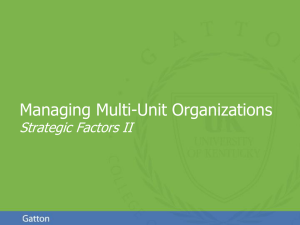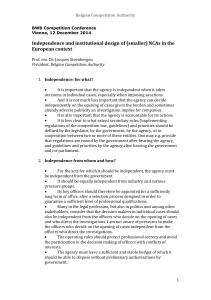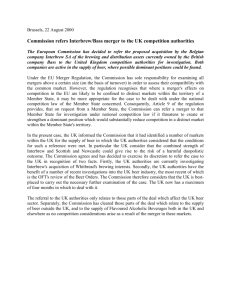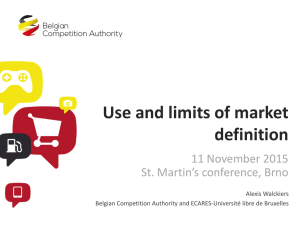International Cooperation on Merger cases as a
advertisement
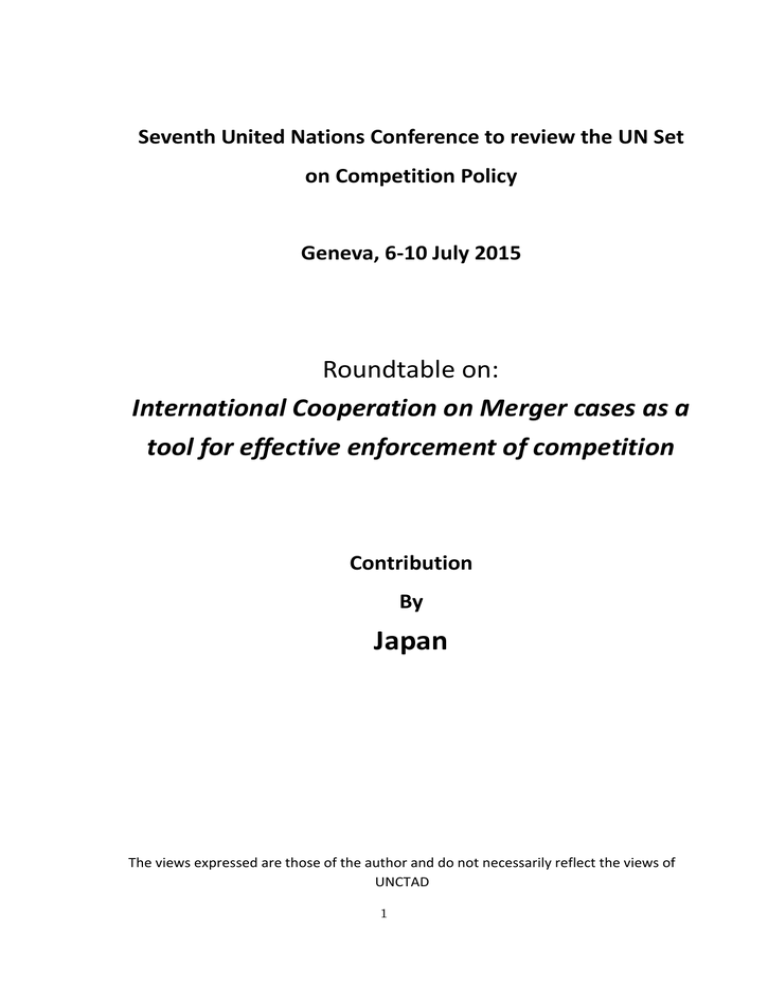
Seventh United Nations Conference to review the UN Set on Competition Policy Geneva, 6-10 July 2015 Roundtable on: International Cooperation on Merger cases as a tool for effective enforcement of competition Contribution By Japan The views expressed are those of the author and do not necessarily reflect the views of UNCTAD 1 1. Introduction In recent years, there have been a growing number of international activities of enterprises, which may affect several jurisdictions. In order to cope with the anticompetitive effect of these activities on Japan, the Japan Fair Trade Commission (JFTC) is keeping a close-knit cooperative relationship with the competition authorities of other countries. Given that there also have been a growing number of merger cases that require simultaneous reviews by more than one competition authority, the JFTC is engaging in international cooperation in merger review. Enhancement of the international cooperation through information exchanges among competition authorities is one of the most important policies of the JFTC in order to enforce the competition law against the cross border infringement more effectively and efficiently. We will now introduce international cooperation in the JFTC’s merger review. We will describe the frameworks for international cooperation in merger review in part 2 below. Part 3 will focus on progress in international cooperation in merger review and part 4 will introduce the case examples where the JFTC cooperated with foreign competition authorities in merger review in light of the progress described in part 3. Part 5 will introduce the JFTC’s contribution to the capacity building concerning merger review in developing countries. 2. Frameworks for international cooperation in merger review The JFTC is to engage in international cooperation in merger review based on the following frameworks. (1) Agreements between Governments or Economies concerning Cooperation on Anticompetitive Activities The government of Japan concluded Agreements between Governments or Economies concerning Cooperation on Anticompetitive Activities with United States of America (1999), European Commission (2003) and Canada (2005) as cooperative agreements regarding competition law. These are administrative implementation agreements concluded independent of the vote by the Japanese Diet, which stipulate procedures regarding: the notification of enforcement activities, cooperation (assistance), the coordination of the enforcement activities, the request of the enforcement activities, the consideration of the important interests of other governments, regular meetings between the competition authorities, the handling of information provided, etc. The JFTC engages in cooperation such as the notification, coordination of enforcement activities etc. with the competition authorities in the U.S., EU, and Canada based on these agreements. (2) Economic Partnership Agreements The government of Japan concluded twelve Economic Partnership Agreements 2 (hereinafter referred to as “EPA”), which include chapters concerning competition. Moreover, there are concrete provisions on cooperation in the competition chapters in EPAs between Japan and Singapore (put into effect in 2002, revised in 2007), Mexico (put into effect in 2005), Thailand (put into effect in 2007), Indonesia (put into effect in 2008), Switzerland (put into effect in 2009), and Peru (put into effect in 2012), etc., which are similar to the provisions of Agreements concerning Cooperation on Anticompetitive Activities, as described above (1). The JFTC can carry out cooperation such as the notification, coordination of enforcement activities with these competition authorities based on the EPAs. (3) Memorandums on Cooperation/Cooperation Arrangements between competition authorities The JFTC concluded Memorandums on Cooperation/Cooperation Arrangements with the Viet Nam Competition Authority (2013), the Philippines Department of Justice (2013), the Administrative Council for Economic Defense of the Federative Republic of Brazil (2014), the Korea Fair Trade Commission (2014) and the Australian Competition and Consumer Commission (in April 2015), as well as the Agreements between governments/countries described in (1) and (2) above. These Memorandums on Cooperation/Cooperation Arrangements between competition authorities have similar provisions to those of Agreements concerning Cooperation on Anticompetitive Activities, as described above. The JFTC can carry out cooperation such as the notification, coordination of enforcement activities with these competition authorities based on the Memorandums on Cooperation/Cooperation Arrangements between competition authorities. (4) Recommendation of the OECD Council concerning International Cooperation on Competition Investigations and Proceeding (Revised in September, 2014) Based on the Recommendation, the JFTC can carry out cooperation such as the notification, coordination of enforcement activities, and information exchanges with competition authorities of OECD member countries which have not concluded Agreements concerning Cooperation on Anticompetitive Activities, or EPA with the Japanese government, or Memorandums on Cooperation/Cooperation Arrangements between competition authorities. This Recommendation was reviewed in the Competition Committee of OECD and revised in September, 2014, as mentioned in below 3 (1). 3. Progress in international cooperation in merger review (1) Efforts for international cooperation in OECD Since 2012, OECD Competition Committee had been discussing international cooperation as the strategic theme to be considered in mid-to-long term. It was pointed 3 out that “Recommendation of the OECD Council concerning Cooperation between Member Countries on Anticompetitive Practices affecting International Trade” (revised in 1995) had not matched to the current progress of globalization of the economy and the rapid diffusion of competition law and policies. Therefore, the necessity of revision of the Recommendation consistent with the current practices for effective international enforcement cooperation among competition authorities was strongly emphasized. Under such circumstances, revision of the Recommendation was considered by the OECD Competition Committee. The proposed revision was approved at the meeting in June, 2014 and the revised “Recommendation of the OECD Council concerning International Cooperation on Competition Investigations and Proceeding” was approved and adopted at the OECD Council in September, 2014. As the main revision, provisions relating to information exchange between competition authorities were reviewed in order to strengthen competition authorities’ ability to exchange information considering the importance of information exchange among competition authorities in international cooperation. It is also recommended to exchange confidential information through waivers and the information gateway under the certain safeguards in addition to the information publicly available or produced within the agencies. The Cooperation Arrangement with the Australian Competition and Consumer Commission, concluded in April 2015, contains provisions that will enable competition authorities to share information acquired in investigative process. This is the first time for the JFTC to conclude a framework which can be named as “second generation” Arrangement. This Arrangement was made in reference to the OECD 1 Recommendation. (2) Efforts for international cooperation in the ICN (International Competition Network) As described above, recently, in accordance with the progress of globalization such as internationalization of enterprises activities, there have been a growing number of international merger cases that require simultaneous reviews by more than one competition authority. Given this trend, ICN Merger Working Group addresses various works in order to promote the international cooperation in merger review. We will introduce the following two works of them which the JFTC actively contributed to. (i) ICN’s Framework for Merger Review cooperation2 In order to ensure that a competition authority coping with international merger cases can effectively conduct the review in cooperation with authorities from other countries, it is necessary to establish a framework for more systematic cooperation. 1 2 http://www.jftc.go.jp/en/pressreleases/yearly-2015/April/150430.html http://www.internationalcompetitionnetwork.org/uploads/library/doc803.pdf 4 Based on such recognition, the JFTC had propounded the establishment of an international cooperative framework for merger review which is intended to facilitate effective and efficient cooperation between and among member agencies of the ICN. The framework was approved at the Annual Conference of the ICN (in April 2012 in Rio de Janeiro). Main contents of the framework are as follows: a. Compiling a contact list of liaison officers in each member jurisdiction of the ICN. b. Procedure of contact and information exchange with interested competition authorities. The Framework has the characteristics such as the following: a. The framework is open to all ICN member agencies. b. The framework does not create any legally binding rights or obligations. The agencies which participate in the framework can engage in cooperation such as information exchange with interested agencies in merger review insofar as it is compatible with international agreements or the law in each jurisdiction with due considerations to the confidentiality obligation. By participating in the framework, competition authorities can expect a reduction in the costs for searching contact points when they are considering co-operating with other interested agencies. They can enjoy the benefit of being able to communicate with interested agencies more rapidly, and launch the merger review more swiftly. However, it should be kept in mind that regarding merger cases where more than one agency is reviewing, the liaison and co-ordination among the agencies through this framework does not prevent each agency’s own independent decision on the merger case, nor does it require some kind of results from the liaison and coordination. (ii) Practical Guide to International Enforcement Cooperation in Mergers3 ICN Merger Working Group established the project on international merger enforcement cooperation and considered developing a practical guidance on cooperation among agencies for the review of multijurisdictional mergers. This Practical Guide was presented and approved at the ICN 2015 Annual conference in Sydney. As a member of the drafting team, the JFTC actively contributed to drafting mainly the part of “IV. COMMUNICATION, TIMING ALIGNMENT AND INFORMATION SHARING” of this Practical Guide in cooperation with US Department of Justice (US DoJ). The guide is intended to serve as: (i) a voluntary and flexible framework for interagency cooperation in merger investigations; (ii) practical guidance for agencies seeking to engage in such cooperation; and (iii) practical guidance for parties and third parties seeking to facilitate cooperation. The 3 http://www.internationalcompetitionnetwork.org/uploads/library/doc1031.pdf 5 Guide elaborates on principles on international cooperation by setting out principles, tips and practices which cooperating agencies may seek to apply, to the extent consistent with their respective laws and enforcement obligations. 4. Examples of cooperation with foreign competition authorities in merger review The chart below shows the recent cases in which the JFTC conducted merger reviews in cooperation with the other competition authorities. Year Case 2012 Main cooperating agencies Business Combination between 4 ASML Holdings N.V. and Cymer Inc. Results of reviews US Department of Justice Accepted on the condition Korea Fair Trade Commission of implementation of the remedies 2013 M&As of operations between Thermo US Federal Trade Commission Accepted without any Fisher Scientific Inc. and Life European Commission conditions US Federal Trade Commission Accepted on the condition European Commission of implementation of the 5 Technologies Corporation 2014 Acquisition of Biomet Inc by Zimmer 6 Holdings Inc. remedies Business Combination between ASML Holdings N.V. and Cymer Inc. is one of the successful case examples where the JFTC co-operated with foreign competition authorities in merger review adopting the progress described in part 3. It is explained as follows: (1) Outline of the transaction ASML US Inc. (headquartered in the United States; hereinafter “ASML US”), the subsidiary of ASML Holdings N. V. (hereinafter “ASML”) that runs business of manufacturing and selling lithography systems used in the front-end process of semiconductor manufacturing, was planning to acquire all the shares of Cymer Inc. (hereinafter “Cymer”) which runs business of manufacturing and selling light sources composing an important part of the lithography system (hereinafter the “Acquisition”). Since November 2012, ASML US voluntarily submitted a written opinion to the JFTC stating that ASML US considered that the Acquisition would not substantially restrain competition in any particular fields of trade. The JFTC had meetings with ASML US upon the request of them. On January 30, 2013, following the meeting, ASML US submitted a notification concerning the plan on the Acquisition to the JFTC under Article 10 (2) of the Antimonopoly Act. The JFTC received this notification and launched the primary review. Thereafter, since the JFTC found that a more detailed review should be needed, on February 28, 2013, the JFTC requested ASML US to submit reports and other necessary 4 5 6 http://www.jftc.go.jp/en/pressreleases/yearly-2013/may/130507.html http://www.jftc.go.jp/en/pressreleases/yearly-2014/June/140611.files/140611.pdf (see case 2) http://www.jftc.go.jp/en/pressreleases/yearly-2015/March/150325.html 6 documents and launched the secondary review. As to the Acquisition, the JFTC concluded that, taking the remedies ASML US proposed, etc. into consideration, the Acquisition would not substantially restrain competition in the particular fields of trade. Accordingly, the JFTC has notified the parties that it will not issue a cease and desist order, resulting in the completion of its review. (2) Cooperation with any other agencies In this case, the JFTC obtained information that the transaction had been notified to the US DoJ, KFTC and other agencies by asking the party concerned which other jurisdictions were reviewing or were expected to review the transaction. This was done before the notification to the JFTC. Based on the information, the JFTC contacted the US DoJ during the JFTC's pre-notification stage and the KFTC during the JFTC's primary review by using the contact list in the ICN’s Framework for Merger Review Cooperation mentioned in 4(2) (i) below. The JFTC exchanged information with these and other agencies on time schedules and substantive issues, such as the scope of the relevant markets. The JFTC exchanged information with the agencies concerned at key stages of its investigation, such as when the parties proposed remedies or before the JFTC made the final decision. 5. Contribution to the capacity building concerning merger review in developing countries In recent years, many developing countries such as those countries in East Asia region are actively strengthening existing competition legislations or introducing them newly in accordance with the increase of awareness of the importance of competition law and policy. Therefore, the demands of technical assistance for these countries are growing. The JFTC, in cooperation with Japan International Cooperation Agency (JICA), etc., have been engaged in technical assistance activities in the areas of the competition law and policy, by dispatching staffs and providing training programs for the competition authorities in developing countries. As the most recent cases, the JFTC staffs explained the importance of merger control regime and the approach to merger review procedures as well as the effect of substantial restraint of competition at the training workshop on merger review for COMESA Competition Commission’s staffs, held in Nairobi, Republic of Kenya, in November 2014. Moreover, the JFTC provided guidance and advice on the draft of merger review guidelines for the Philippine Department of Justice in cooperation with JICA, in February 2015. 7
